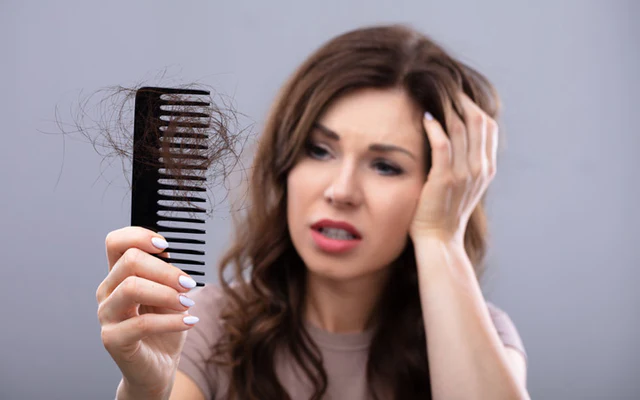Introduction
Having a full head of healthy hair is not just about aesthetics – it’s often linked to self-confidence and self-esteem. However, various factors can contribute to hair fall and thinning, leaving you feeling frustrated and self-conscious. But there’s good news! With the right knowledge and approach, you can effectively combat hair fall and regain your hair’s natural beauty.
Understanding the Hair Growth Cycle
Before diving into remedies, it’s crucial to understand how hair grows. The hair growth cycle consists of three phases: anagen, catagen, and telogen. The anagen phase is the growth phase, while catagen is the transition phase, and telogen is the resting phase. Hair fall is a natural part of this cycle, with around 50 to 100 hairs shed daily.
Common Causes of Hair Fall
Genetic Predisposition
Genetics play a significant role in hair fall patterns. If your parents or grandparents experienced hair loss, you might be genetically predisposed. This is known as androgenetic alopecia, or male/female pattern baldness.
Hormonal Imbalance
Hormones can influence hair growth. Conditions like polycystic ovary syndrome (PCOS) can lead to excess androgen production, resulting in hair thinning. Hormonal changes during pregnancy and menopause can also contribute.
Poor Nutrition
Your hair’s health reflects your diet. A deficiency in essential nutrients like vitamins A, C, D, and E, as well as biotin and iron, can lead to brittle hair and hair fall.
Stress and Lifestyle Factors
Stress can push hair follicles into the telogen phase, causing hair shedding. Unhealthy lifestyle choices like smoking and excessive alcohol consumption can also impact hair health.
Creating a Hair Care Routine
A well-rounded hair care routine can work wonders for combatting hair fall.
Choosing the Right Shampoo and Conditioner
Select shampoos and conditioners that are free of harsh chemicals like sulfates and parabens. Look for products with ingredients like biotin, keratin, and saw palmetto that promote hair strength.
Scalp Massage and Blood Circulation
Regular scalp massages improve blood circulation to the hair follicles, ensuring a steady supply of nutrients and oxygen. Use essential oils like lavender or rosemary for added benefits.
Hair Masks and Treatments
Natural hair masks with ingredients like yogurt, eggs, and aloe vera can provide deep nourishment. Apply once a week to rejuvenate your hair.
Avoiding Excessive Heat and Styling
Heat styling tools can damage your hair shafts, leading to breakage. Embrace your natural hair texture and limit the use of heat.
Nutrition for Healthy Hair
Incorporating Protein-Rich Foods
Proteins are the building blocks of hair. Include lean meats, eggs, legumes, and nuts in your diet to ensure a protein-rich intake.
Vitamins and Minerals for Hair Health
Vitamin A promotes sebum production for a natural conditioner, while vitamin E improves blood circulation in the scalp. Biotin and zinc are also essential for hair growth.
Hydration and Omega-3 Fatty Acids
Staying hydrated maintains hair elasticity. Omega-3 fatty acids found in fish, flaxseeds, and walnuts provide essential oils for scalp health.
Lifestyle Changes for Stronger Locks
Managing Stress and Prioritizing Sleep
Practicing stress management techniques like yoga and meditation can prevent hair fall. Quality sleep ensures your body’s rejuvenation, benefiting your hair health.
Regular Exercise and Its Impact on Hair
Exercise improves blood circulation, delivering nutrients to hair follicles. Aim for at least 30 minutes of physical activity most days of the week.
Limiting Smoking and Alcohol
Smoking restricts blood flow to the hair follicles, accelerating hair loss. Similarly, excessive alcohol consumption can weaken hair strands.
Professional Interventions
Consulting a Dermatologist or Trichologist
If hair fall persists, consult a dermatologist or trichologist. They can identify underlying causes and recommend appropriate treatments.
Medical Treatments for Hair Restoration
Options like minoxidil and finasteride are FDA-approved medications that promote hair growth. These treatments should be used under medical supervision.
Hair Transplants and PRP Therapy
For more advanced cases, hair transplant procedures or platelet-rich plasma (PRP) therapy can be effective in restoring hair density.
Home Remedies and Natural Treatments
Aloe Vera for Scalp Health
Aloe vera soothes the scalp, reduces inflammation, and promotes hair growth. Apply aloe vera gel directly or use products containing aloe vera extract.
Coconut Oil as a Nourishing Agent
Coconut oil penetrates hair shafts, preventing protein loss and reducing breakage. Massage warm coconut oil onto your scalp and leave it overnight.
Onion Juice and Its Benefits
Onion juice is rich in sulfur, which improves blood circulation to hair follicles and regenerates hair. Apply onion juice to your scalp and rinse after 30 minutes.
The Psychological Impact of Hair Loss
Building Self-Confidence
Hair fall can take a toll on your self-esteem. Embrace your unique beauty and focus on your strengths to build self-confidence.
Support Groups and Mental Well-being
Joining support groups or talking to a therapist can provide emotional relief. Remember, you’re not alone in this journey.
Conclusion
Combatting hair fall and thinning requires a holistic approach. From understanding the hair growth cycle to adopting a nourishing diet, incorporating lifestyle changes, and seeking professional guidance when needed, you have a range of effective strategies at your disposal. Remember, patience is key, and with consistent efforts, you can tame those tresses and regain the confidence that comes with healthy hair.
FAQs
- Can stress alone cause hair fall? Stress can contribute to hair fall by pushing hair follicles into the resting phase, but it’s rarely the sole cause.
- Are natural remedies as effective as medical treatments? Natural remedies can help improve hair health, but severe cases might require medical interventions for optimal results.
- Can hair fall be reversed completely? In many cases, hair fall can be managed and reduced. However, complete reversal depends on individual factors.
- How often should I wash my hair to prevent hair fall? Washing hair every 2-3 days with a mild shampoo can help maintain scalp health without stripping natural oils.
- Is hair fall affected by climate changes? Extreme weather conditions can impact hair health, but a well-maintained hair care routine can counter these effects.



